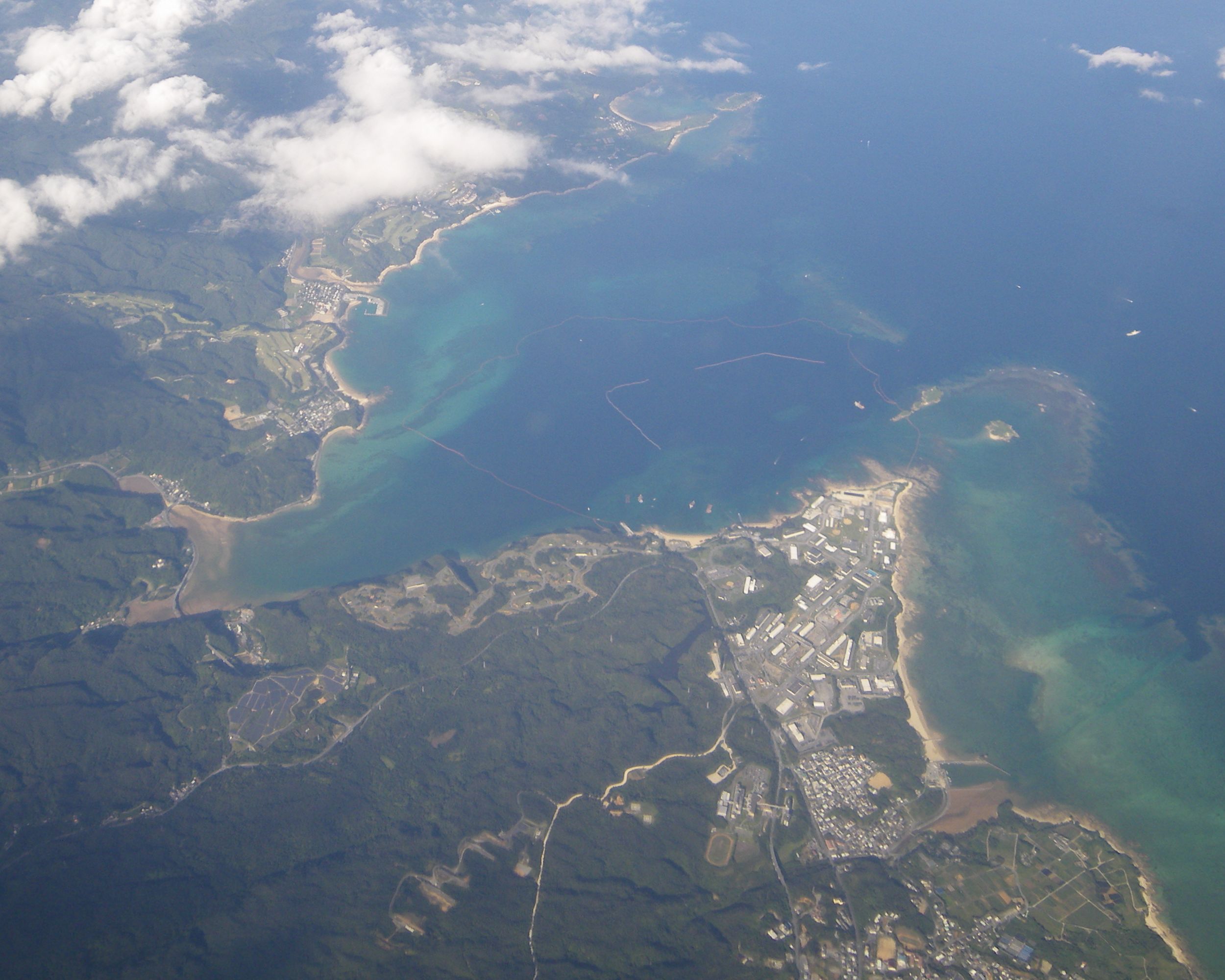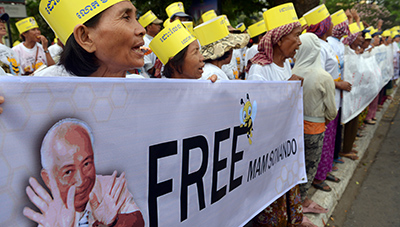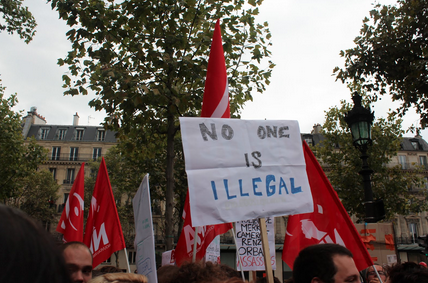What happened on February 24th should not be regarded as just another day in Japanese politics. It was the day 70% of Okinawans voted to oppose plans to relocate the Futenma Air Station to Henoko, a remote location in the prefecture with endangered coral reefs.[1] As the central government plans to move forward with the relocation, it is worth noting the irony of a democratic nation choosing to ignore its citizens. Although it was a non-binding referendum, meaning the results were not directly going to influence the relocation plans, the results clearly suggest a need for lawmakers to persuade voters on this costly and controversial decision that will impact many generations to come.[2] While it does not seem reasonable to push American bases out of Okinawa immediately, this referendum provides ample reason to weigh the options available and evaluate what each would entail.
At the moment, appeasing all sides seems impossible. The Okinawa prefectural government has been feuding with the central government for more than 10 years now. The arrival of anti-base governor Denny Tamaki last year ensures this rift will persist. As aforementioned, the result of the referendum in February suggests that over 70% of Okinawans (with a 53% turnout) agree with the governor and oppose the transfer of the base.[3] However, Prime Minister Abe has not been overly enthusiastic about making comments on the referendum. Instead, it seems he has his sights set on the provincial elections in April and the upper house elections in July.[4] Coming out strong against a group of constituents would certainly harm the Liberal Democratic Party’s (LDP) chances of maintaining the majority necessary to pass the resolution to revise Article 9, one of Abe’s chief goals.[5] According to a Kyodo news survey conducted on March 10th, public support for the Prime Minister’s cabinet has fallen 2.3% from the previous survey to 43.3%, and 69% of respondents want the referendum results to be respected.[6] This sheds light on how poorly the government has explained the ordeal throughout the years, and how the implications of this referendum may spread nationwide—perhaps even to the point where the LDP’s majority is threatened.
This was not the first prefectural referendum regarding the U.S. bases. This February referendum was the fifth base-related referendum, the fourth to be held in Okinawa, and the first referendum held specifically regarding the Henoko relocation.[7] In a 1996 referendum, 53% of voters supported a reduction of U.S. bases in Okinawa.[8] While the results and issue at hand were notably different from this year’s referendum, it shows that Okinawans have consistently supported removal of U.S. presence in the prefecture. Okinawans argue that the new site will destroy the area’s delicate marine ecosystem and threaten the livelihood of 2,000 local citizens.[9] This threat comes in the form of crime and noise pollution deemed as direct results of U.S. presence in Okinawa, especially after a 12-year-old girl was abducted and raped in 1995 by three American servicemen.[10] As a result, there is bitter resentment toward the American bases. Coupled with the lingering effects of the Pacific War and such incidents, many Okinawans have a staunch anti-base view that persists to this day.
It is true that it is not realistic to completely remove U.S. bases immediately, as Japan is heavily invested in them for national security.[11] However, the utter lack of a formal justification by the central government hasn’t helped. Throughout the years, the government has consistently presented the situation as if it were out of Okinawans’ hands from the beginning, with Prime Minister Abe claiming, “We cannot avoid the necessity of moving Futenma [air base]. We can’t put this off any longer.”[12] To add salt to the wound, President Trump is drawing up preposterous plans to make Japan pay the full price for American soldiers on their soil, for the “privilege” of hosting them.[13] This would mean that despite ongoing opposition to U.S. military presence, Okinawans and Japanese citizens nationwide would be required to pay for their presence in the form of tax revenues.
While it is easy to criticize the government for largely ignoring the referendum, it is also worth considering the negative implications of removing American presence from Okinawa. The most immediate consequence that comes to mind is the loss of deterrence from imminent threats to national security, such as incursions by North Korea and China. However, the presence of American soldiers likely won’t protect citizens in the event of missile attacks on the mainland (as argued in a previous piece). There are also concerns that the economic benefits from hosting the U.S. bases may be lost when the base is removed. Okinawans, on the other hand, would argue that the ratio of revenue from hosting the bases has dropped from 15.5% in 1972 to 5.3% in 2015.[14] Furthermore, their economy does well enough without the bases through tourism, which accounts for approximately 16% of the economy and has yielded 700 billion yen in fiscal year 2017, growing steadily at almost 5% a year.[15][16] This seems to counter the claim that the bases are an absolute necessity for Okinawa’s economy.
One must also consider how unrealistic and costly the process of removal would be. To put it bluntly, there is no real plan for what would happen after the removal of U.S. bases. This is evident from the fact that the prefectural government has only succeeded in delaying relocations and removals, rather than providing an alternative plan.[17] While it may seem undemocratic to ignore the pleas of Japanese citizens, U.S. presence in Japan has helped to mitigate any real conflict with neighboring countries. It can also be argued that the prefectural government has not considered this issue at the foreign policy level. In some ways, U.S.-Japan relations are symbolized by the bases as signs of the strong relationship cultivated after World War II. However, they are also symbols of defeat and horror for Okinawans, many of whom experienced the bloody battles themselves. It is a delicate issue that cannot be delayed any longer. If Japan decides to remove U.S. bases, the process could take up to 15 years, during which they would then have to renegotiate their security pact with the U.S.[18] This costly and arduous process would undoubtedly impact security in Asia and possibly lead to deteriorating relations between the U.S. and Japan. Either way, much more convincing arguments on both sides of the issue must be made before making this consequential decision.
So is there a way to appease all parties in this strenuous ordeal? Is it too late to make any major moves? The government has the choice to either allow the bickering to continue or end it once and for all. While they do hold the upper-hand in that they may proceed with the base’s relocation regardless of the results of any referendum, the government should still hold a national referendum. A nationwide referendum would bring clarity to the situation and provide an opportunity for the government to more firmly establish its claim. Furthermore, a national referendum may help the government uphold its legacy as a democratic nation. Domestically, it would provide solid justification for proceeding with the relocation, while simultaneously securing victory in the elections. Internationally, Japan would uphold its legacy as a liberal democracy.
For this to be a “proper” referendum, however, Japan should not follow in the footsteps of Britain, who failed miserably in their 2016 Brexit referendum. Before bringing the issue to a vote, the government must provide substantial platforms for discussion on the issue and actually explain what the relocation would mean for the nation. People must educate themselves and recognize the dire nature of the situation, as well as consider how this decision will impact future generations. Only then can this issue finally be brought to a close in a democratic and just manner, treating Japanese citizens with the respect they deserve and cementing Japan’s standing as one of the world’s strongest democratic nations.
[1] Sieg, Linda. “Japan to push ahead with U.S. base relocation despite Okinawa referendum result.” Reuters. February 25, 2019. Accessed March 13, 2019. https://www.reuters.com/article/us-japan-okinawa/japan-to-push-ahead-with-us-base-relocation-despite-okinawa-referendum-result-idUSKCN1QE06Q.
[2] Ibid.
[3] Ibid.
[4] Ibid.
[5] Iizuka, Satoshi. “Okinawa Base Referendum Could Deal Nationwide Electoral Blow to Abe.” The Japan Times. February 28, 2019. Accessed March 13, 2019. https://www.japantimes.co.jp/news/2019/02/28/national/politics-diplomacy/okinawa-base-referendum-deal-nationwide-electoral-blow-abe/#.XIkM-ShKjic.
[6] Kyodo News. “Abe Support Rate Falls; 69% Want Okinawa Vote on Base Issue Respected.” The Japan Times. March 10, 2019. Accessed March 13, 2019. https://www.japantimes.co.jp/news/2019/03/10/national/politics-diplomacy/abe-support-rate-falls-69-want-okinawa-vote-base-issue-respected/#.XIkNPyhKjic.
[7] Eldridge, Robert D. “Okinawa Referendum Could Bring Clarity.” The Japan Times. August 19, 2018. Accessed March 13, 2019. https://www.japantimes.co.jp/opinion/2018/08/19/commentary/japan-commentary/okinawa-referendum-bring-clarity/#.XIkNyyhKjic.
[8] Pollack, Andrew. “Okinawans Send Message to Tokyo and U.S. to Cut Bases.” The New York Times. September 09, 1996. Accessed March 13, 2019. https://www.nytimes.com/1996/09/09/world/okinawans-send-message-to-tokyo-and-us-to-cut-bases.html.
[9] McCurry, Justin. “Okinawa Referendum: Everything You Need to Know.” The Guardian. February 22, 2019. Accessed March 13, 2019. https://www.theguardian.com/world/2019/feb/22/okinawa-referendum-everything-you-need-to-know.
[10] Ibid.
[11] Eldridge, Robert D. “Okinawa Referendum Could Bring Clarity.”
[12] Sieg, Linda. “Japan to push ahead with U.S. base relocation despite Okinawa referendum result.”
[13] Wadhams, Nick, and Jennifer Jacobs. “Trump Seeks Huge Premium From Allies Hosting U.S. Troops.” Bloomberg.com. March 08, 2019. Accessed March 13, 2019. https://www.bloomberg.com/news/articles/2019-03-08/trump-said-to-seek-huge-premium-from-allies-hosting-u-s-troops.
[14] Nakamura, Keita. “Okinawa Sees Path to Economic Independence without U.S. Bases.” The Japan Times. October 27, 2018. Accessed March 13, 2019. https://www.japantimes.co.jp/news/2018/10/27/national/okinawa-sees-path-economic-independence-without-u-s-bases/#.XIkYrndFxHx.
[15] Prefectural Government of Okinawa. “Summary of Tourism.” September 2018. Accessed March 14, 2019.
[16] Bank of Okinawa. “The Business Environment in Okinawa Prefecture.” Accessed March 14, 2019. https://www.okinawa-bank.co.jp/_files/00023696/rb_fy2011_03.pdf.
[17] Eldridge, Robert D. “Okinawa Referendum Could Bring Clarity.”
[18] Terehov, Vladimir. “Consequences of Okinawa Referendum.” New Age. March 12, 2019. Accessed March 13, 2019. http://www.newagebd.net/article/67095/consequences-of-okinawa-referendum.



